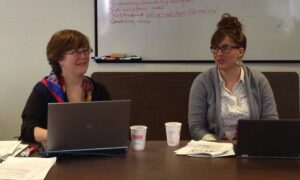
Christine Friese, Vermont’s Assistant State Librarian, and Tess Gauthier of the Snelling Center for Government are members of the newly formed statewide Vermont Digital Skills Roundtable.
Last December the Vermont Department of Libraries and the Vermont Telecommunications Authority (VTA) convened a roundtable discussion with a diverse group. It focused on the need for Vermonters to have digital skills in order to thrive and participate in the greater online community. I was proud to be included among the group of 19 individuals who attended, representing organizations involved in education, libraries, training, economic development, community action, state government, public information, support for families, and support for individuals with physical challenges. The group explored the high demand for basic skills training in using computers, tablets, and mobile devices, plus the growing need to understand and more effectively use Internet resources. Two goals for this initial meeting were: (1) to identify the roles and current programs of various organizations across the state in teaching digital and Internet skill- building to citizens, and (2) to share best practices.
A little background helps set the stage for this Roundtable’s mission. When Governor Shumlin took office and launched a strategic planning process across state government, the need for digital literacy became an important part of interagency conversations. The Department of Libraries stepped forward to take responsibility for developing more robust digital literacy training in local libraries – and for establishing collaboration with other organizations involved in similar activities. Public libraries have been involved in public computing and digital skills training for years, serving as vital resources for those who don’t own computers or have access to the Internet.
According to Marty Reid, State Librarian, “Public libraries across the country are taking on an increased role in digital literacy training for citizens of all ages, and in Vermont our libraries are an important part of our state’s larger ‘digital training network.’ The Department of Libraries is excited about expanding digital literacy training opportunities in our public libraries, and working across state government and with a variety of non-profits and organizations to develop a statewide strategy to help citizens become capable users of 21st century technologies.”
Current initiatives discussed at the meeting included: use of tablets in K-12 classrooms, e-Commerce consulting for small businesses by the Vermont Small Business Development Center, and a mobile digital lab in the Northeast Kingdom used mainly for adult learners.
For example, Maree Bushey from Northeast Kingdom Learning Services is passionate about her organization’s mission to provide no-cost digital literacy classes. There are no eligibility requirements to take part and classes are offered at five different centers in the NEK. “In addition,” Bushey explained, “since transportation is the biggest issue for our clients, we created a mobile lab to meet this challenge. We are excited to report that it is the first mobile GED testing site in the country!”
The focus for training is not just on beginners. Without needing to look very far down the road, it’s clear that teaching advanced skills and information literacy for youth will ensure that Vermont’s children are prepared to build a strong future for themselves and their communities.
The Roundtable has agreed to meet on a monthly basis to ensure that progress continues on the statewide strategic initiative. Future projects may include conducting an audit of current digital skills training and needs, selecting target groups or populations for preliminary focus, and creating a mission statement for the group that is aligned with the State’s vision for economic growth.
If one thing is sure, Vermont has lots of organizations committed to digital and Internet literacy training for our citizens!
If you are interested in Digital Literacy, there are four upcoming iConnect workshops, which teach people how to work with internet beginners.
